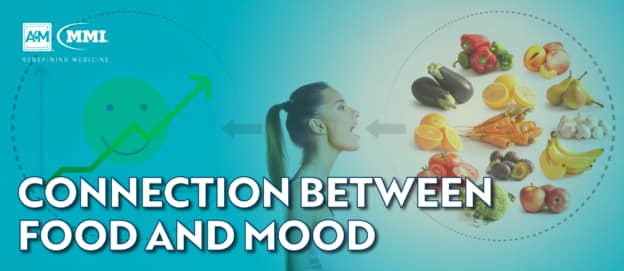The Connection Between Food and Mood
Click Here to See The Original Blog
The role of nutrition in the development of mood disorders has recently become a central focus of clinical research. In recent years, public awareness of the intimate relationship between the brain and mental wellbeing has increasingly grown. The high metabolic and nutrient demands of the brain — which consumes 20% of a person’s daily caloric intake — suggest a connection between dietary choices and cognitive function, sparking a multitude of studies seeking to determine the specific connections of nutrients and mood disorders.
The burgeoning field of nutritional psychiatry is examining the correlations between nutritional patterns and mental health, closely evaluating the effects of food on the structure and function of the brain. While the relationship between diet and mood disorders remains unclear, there is a strong indication that dietary changes can improve mental health and reduce the risk of disorders, depression in particular.
Diet and Mood
Multiple studies have found a strong correlation between a diet high in refined sugars and impaired brain function, even the worsening of depressive symptoms. Diets high in refined sugars have been proven harmful to the brain, diminishing the body’s ability to regulate insulin and thus promoting inflammation and oxidative stress.
A recent study examined the association between diet quality and mental health in children and adolescents, finding evidence of a significant, cross-sectional relationship between unhealthy dietary patterns and poorer mental health. The study revealed the importance of healthy dietary patterns on mental health and the benefits of beginning proper eating habits early in the lifespan. Eating high-quality foods containing vitamins, minerals, and antioxidants nourishes the brain, protects it from stress, and improves overall cognitive functioning.
Importance of Serotonin
The neurotransmitter serotonin helps regulate sleep and appetite, mediate moods and inhibit pain. About 95% of serotonin is produced in the gastrointestinal tract, indicating a strong connection between the digestive system and mental wellbeing.
The function and production of this neurotransmitter is heavily influenced by the levels of good bacteria in the intestinal microbiome; ensuring adequate levels of good bacteria has proven to reduce anxiety levels and stress.
Depression and Diet
Although research in the field of nutritional psychiatry is still growing, data pulled from observational studies have revealed a strong connection between food and mental state.
For instance, a large observational study found links and associations between obesity and depression. A 2011 study published in the American Journal of Clinical Nutrition found that consuming vitamin D rich foods lowered the risk of depression in women.
In 2014, a study in Brain, Behavior and Immunity revealed an association between depression and diets rich in sugar, refined grains and red meat. Similarly, a 2018 meta-analysis found a correlation between high meat consumption and increased risk of depression.
Beneficial Dietary Patterns
A single nutritional factor that increases or decreases the risk of depression and other mood disorders is yet to be identified. Many different factors need to be taken into account; lifestyle, genetics, and environment are all interrelated and play a part in the complex interaction that leads to the development of mood disorders. Therefore, research is still inconclusive as to how exactly a specific food or dietary pattern may affect risk, however, adhering to a well-balanced, healthy diet has the potential to improve both the physical and mental state.
A recent study found that high adherence to the Mediterranean style diet was consistently associated with a reduced risk for stroke, depression and cognitive impairment, independent of age. Over the years, there has been undeviating evidence for the overall health benefits of the Mediterranean diet, and more recently, of its ability to reduce the risk of depression. Other studies have compared traditional Japanese and Mediterranean diets to the Western diet, revealing a 25-35% lowered risk of depression associated with the former. These diets tend to be rich in fruits, vegetables, unprocessed grains, lean protein, and low in red meat, unhealthy fats, and refined sugars.
Modifiable lifestyle factors such as dietary choices, smoking, and physical activity levels have the potential to affect the risk of depression, but they do not act independently. The clinical evidence available today strongly suggests a correlation between healthy eating and improved mental health. Thus, there is good reason to focus on dietary choices, not only for their physical advantages but also for the emotional and cognitive benefits.
Although the field of nutritional psychiatry is new, there is observational data revealing an association between diet quality and mental health across populations. By helping patients shape their diets, practitioners can help improve mental health and decrease the risk of psychiatric disorders and depressive symptoms in our increasingly stressed society.
Want more information? Get in touch with us today!







